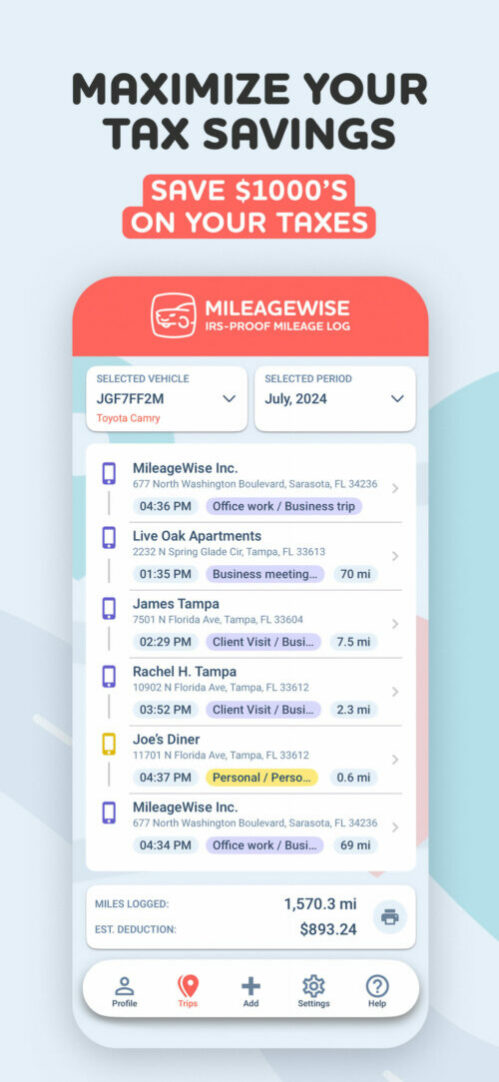When it comes to managing business expenses, understanding how to write off a car for business purposes can be incredibly beneficial. This article will break down the process, making it easy to understand how you can leverage this tax deduction to save money. Whether you’re a sole proprietor or a small business owner, knowing the ins and outs of this financial strategy can help you better manage your expenses.

Try MileageWise for free for 14 days. No credit card required!
Dashboard
What Does “Writing Off” a Car Mean?
Writing off a car for business means deducting the costs associated with using that vehicle from your taxable income. This can significantly reduce your tax liability, allowing you to keep more of your hard-earned money. But how does writing off a car for business work specifically? Let’s dive into the details.
Eligibility for Writing Off a Car
Before you can write off a car, it’s essential to determine whether you’re eligible. Here are some general criteria:
- Business Use: The vehicle must be used for business purposes. Personal use can disqualify you from certain deductions.
- Ownership: You must own the vehicle or lease it to qualify for deductions.
- Documentation: Keeping accurate records is crucial. You need to log mileage and document expenses related to the vehicle.
Methods for Writing Off a Car
There are two primary methods for writing off a car for business: the standard mileage rate method and the actual expense method. Each has its benefits, and the choice will depend on your specific situation.
1. Standard Mileage Rate Method
The standard mileage rate method allows you to deduct a specific amount for each mile driven for business purposes. For 2024, the IRS standard mileage rate is 67 cents per mile. Here’s how it works:
- Keep a detailed mileage log, noting the date, purpose, and miles driven for each trip.
- At the end of the year, multiply your business miles by the standard mileage rate.
- This total is your deduction for the year.
2. Actual Expense Method
The actual expense method involves deducting the actual costs incurred while operating the vehicle for business. This can include:
- Gasoline: Fuel costs associated with business use.
- Repairs and Maintenance: Any expenses related to keeping the car in good working order.
- Insurance: The cost of insuring the vehicle.
- Depreciation: A portion of the car’s value over time.
- Lease Payments: If you lease your vehicle, those payments can also be deducted.
Choosing the Right Method
Deciding between the standard mileage rate and the actual expense method can be challenging. Here are some factors to consider:
- If you drive a lot for business, the standard mileage rate may result in a higher deduction.
- If your vehicle expenses are substantial (like a high-end car), the actual expense method might be more beneficial.
- Keep in mind that if you choose the standard mileage rate in the first year, you can switch to the actual expense method later, but not vice versa.
Record Keeping and Documentation
Regardless of the method you choose, keeping meticulous records is crucial when writing off a car for business. Here’s what you should document:
- Mileage Log: Note each trip’s date, purpose, and miles driven.
- Receipts: Save all receipts related to car expenses, including fuel, repairs, and insurance.
- Business Use Percentage: If the vehicle is used for both personal and business purposes, calculate the percentage of business use for accurate deductions.
Tax Implications and Considerations
Writing off a car for business can lead to significant tax savings, but it’s essential to understand the implications:
- Tax Bracket: The amount you save depends on your tax bracket. Higher earners will benefit more from deductions.
- Depreciation Recapture: If you sell the car later, you may have to pay taxes on the depreciation you previously claimed.
- Consult a Professional: Tax laws can be complex and vary by location. Consulting with a tax professional can help ensure you maximize your deductions correctly.
Conclusion
In summary, writing off a car for business can be a valuable financial strategy that helps you save on taxes. By understanding the eligibility criteria, methods for deduction, and the importance of meticulous record-keeping, you can effectively manage your business expenses. Whether you choose the standard mileage rate or the actual expense method, being informed will empower you to make the best decision for your business. Remember to consult with a tax professional if you have any doubts or need personalized guidance.
Arming yourself with the right information about how to write off a car for business will not only simplify your financial management but also enhance your overall business strategy.
Level Up Your Mileage Tracking
MileageWise: Tracks trips automatically via vehicle movement, Bluetooth, and Plug’N’Go without draining your battery.
AI-Powered Mileage Recovery: The AI Wizard helps reconstruct past mileage logs, filling gaps in your log to ensure compliance.
Built-in IRS Auditor: Checks and corrects up to 70 logical errors in logs, ensuring they meet IRS standards for tax deductions.
Web Dashboard & Team Collaboration: Manage logs, import trips, and collaborate with teams through the web dashboard, ideal for businesses.
Try it for free for 14 days. No credit card required!



